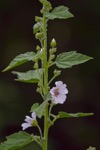| Scientific: | Althaea officinalis |
|---|---|
| Other: | Marshmallow |
| Family: | Malvaceae |
Marshmallow is one of the most valuable demulcent herbs for the gastrointestinal, respiratory and urinary tract. The roots, leaves, and flowers contain polysaccharides that yield viscous mucilage when extracted in water. This " slimy " liquid directly coats and protects mucous membranes in the digestive tract to relieve heartburn, stomach ulcers, and sore throats.
Marshmallow has a mysterious indirect " reflex " action on the lungs and urinary tract. It relieves irritation in the bladder and supports other herbs that treat urinary tract infections (UTI). In the lungs, it reduces inflammation of the airways and moistens and soothes a dry cough. In addition to its demulcent effect, research shows it acts as a cough suppressant and bronchodilator. However, unlike stimulatory herbs like ephedra, the mechanism is unrelated to B-adrenergic receptors, making it appropriate for people with hypertension.
Research shows polysaccharides in marshmallow stimulate tissue regeneration that helps to heal ulcers and wounds. Although not a primary antimicrobial herb, it does demonstrate some antibacterial activity against gram-positive bacteria (Staphylococcus aureus) but not gram-negative bacteria. Externally the marshmallow poultice can help drain and heal sores, boils, and abscesses.
Leaf and roots are high in mucilage making them an excellent demulcent for soothing irritated mucous membranes.
Gastrointestinal
• general inflammation of GI tract
• esophagitis
• gastroesophageal reflux disorder (GERD)
• gastritis
• laryngitis
• colitis
• gastric ulcers
• apthous ulcers
• irregular bowels
• constipation
• diarrhea
Urinary
• inflammation and infection
- cystitis
- urinary tract infections (UTI)
- interstitial cystitis
• urethritis
• calculi
• urolithiasis
Respiratory
• dry irritating cough
Dermatologic (topically)
• suppurative infections (poultice)
• abscesses (poultice)
• boils (poultice)
• furuncles
• ulcers
• varicose veins
• bed sores
• Demulcent
• Emollient
• Expectorant
• Vulnerary
• Antiinflammatory
• Diuretic
Mucilage
Soluble Fiber
Tannins (Root)
Flavonoids
Phenolic Acids
Hypoglycemic • Due To Soluble Fiber
• Tincture (1:5 in 25% EtOH): 1-4 ml tid (Alcohol extracts are less effective at extracting mucilage compared to infusion)
• Cold infusion (dried root): 1-3 tsp/cup
Note: if you obtain the whole root, you will need to let the infusion sit overnight to extract the mucilage. Powdered root only requires 5-10 mins with shaking to extract the mucilage.
Generally considered safe when used as indicated.
• May reduce drug absorption• take medications away from soluble fibre because it may reduce their efficacy.
Barnes J, Anderson LA, Phillipson JD. Herbal Medicines, 3rd ed. London: Pharmaceutical Press, 2007.
Bone K. Principles and Practice of Phytotherapy. Edinburgh: Churchill Livingstone, 2000.
Bone K. A Clinical Guide to Blending Liquid Herbs: Herbal Formulations for the Individual Patient. St Louis, MO: Churchill Livingstone, 2003.
Brinker F. The Toxicology of Botanical Medicines, 3rd ed. Sandy, Oregon: Eclectic Medical Publications, 2000.
Felter HW, Lloyd JU. King's American Dispensatory. 1898. http://www.ibiblio.org/herbmed/eclectic/kings/main.html. Accessed: August 19, 2006.
Hoffman D. Medical Herbalism. Rochester, Vermont: Healing Arts Press, 2003.
Weiss RF. Herbal Medicine. Beaconsfield, England: Beaconsfield Publishers Ltd, 1988.
Williamson EM, ed. Major Herbs of Ayurveda. Edinburgh: Churchill Livingstone, 2002
Disclaimer: This content is subject to change. The information is intended to inform and educate; it does not replace the medical evaluation, advice, diagnosis or treatment by a healthcare professional. www.nhpassist.com © 2014 NDAssist Inc. and/or its affiliates. All rights reserved.

|
Marshmallow
SummaryMarshmallow is one of the most valuable demulcent herbs for the gastrointestinal, respiratory and urinary tract. The roots, leaves, and flowers contain polysaccharides that yield viscous mucilage when extracted in water. This " slimy " liquid directly coats and protects mucous membranes in the digestive tract to relieve heartburn, stomach ulcers, and sore throats. IndicationsSign in requiredActionsSign in requiredConstituentsSign in requiredPosologySign in requiredSafetySign in requiredInteractionsSign in requiredReferencesSign in required |
|---|